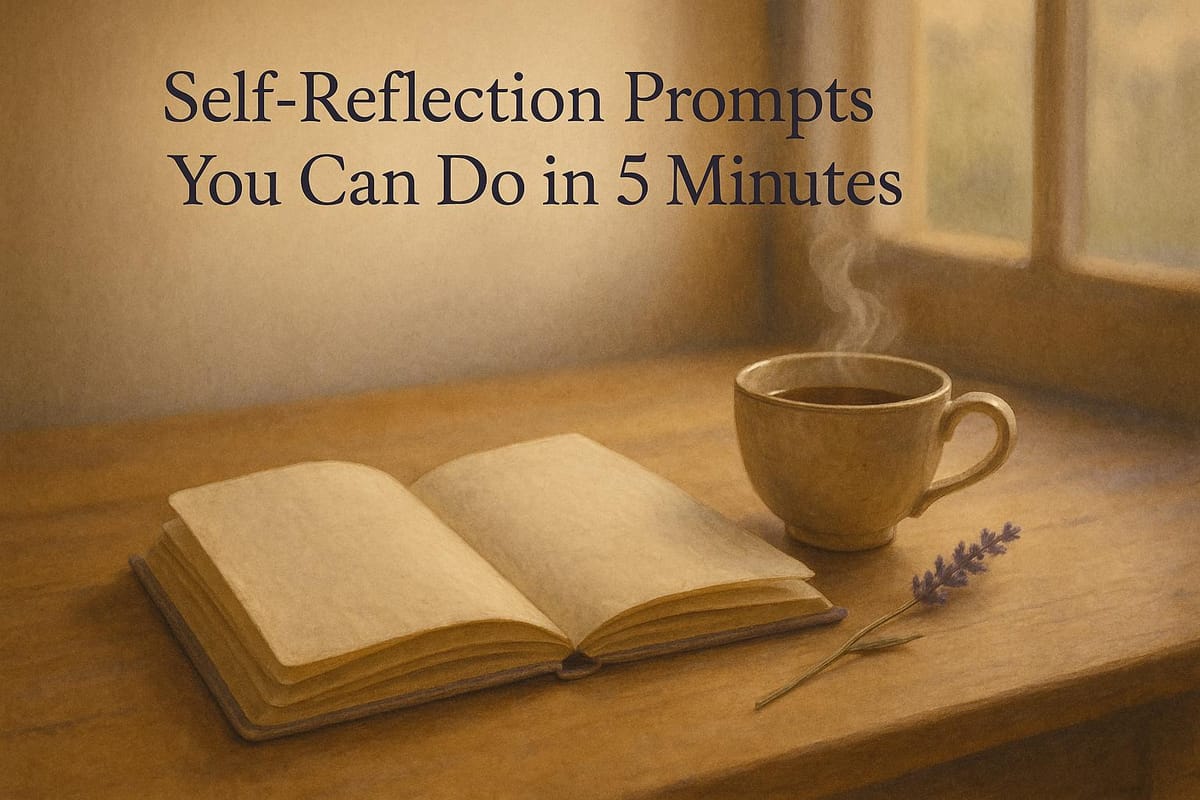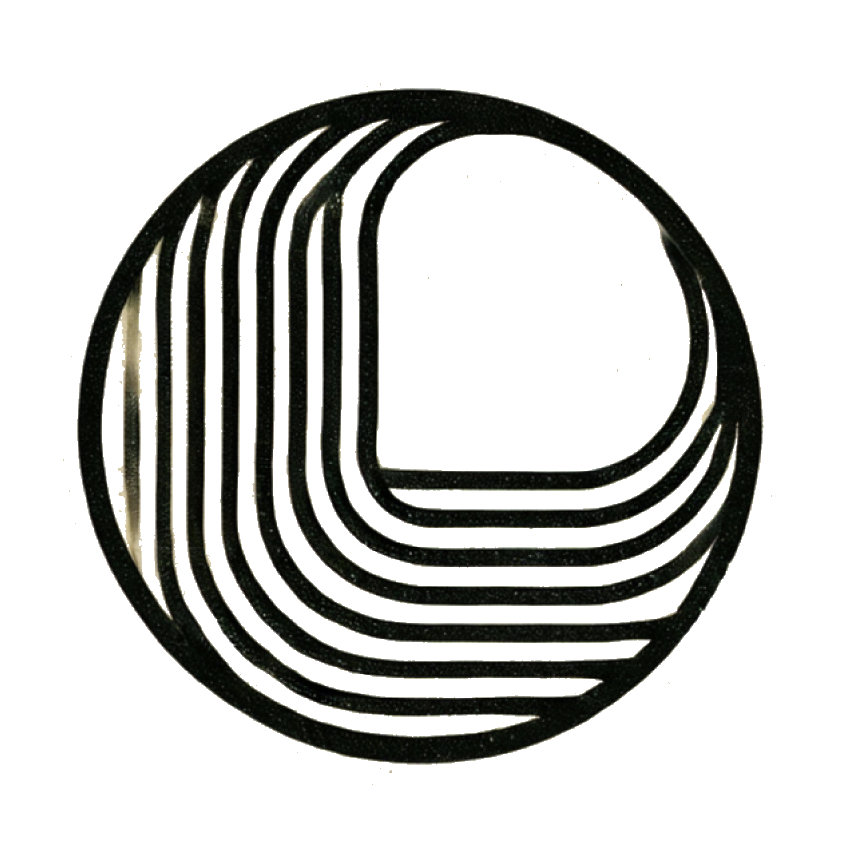24 Journaling Prompts For Self Reflection to Put Yourself First
Discover 24 powerful self-reflection journaling prompts inspired by Carl Jung to help you choose yourself, break old patterns, and reconnect with your true inner voice. Learn how to reflect deeply, set aligned intentions, and transform your life from within.

📌 TL;DR — 24 Self-Reflection Prompts
Want to examine your past choices more deeply? Our guide on reflecting on past decisions through journaling walks you through it step by step.
Quality self-reflection prompts create productive discomfort: "What am I pretending not to know?" "Where am I playing small?" "What would I do if I knew I couldn't fail?" Use a variety of prompts over time to build a complete self-portrait. The prompts you want to skip often hold the most insight.
Why Self-Reflection Journaling Is the Doorway to Your Real Life
Self-reflection journaling forces you to confront the gap between who you are and who you pretend to be, which Jung called the essential first step toward individuation.
When was the last time you looked at yourself in the mirror and honestly asked:
“Am I truly living the life I want –
not the one others expect,
not the one that looks ‘right’ on the outside,
but the one that actually feels true in my bones?”
Most people never sit with that question long enough for it to do its work.
Carl Jung spent his life studying what happens when we don’t.
He warned that if you ignore your inner truth long enough, it doesn’t disappear –
it returns as anxiety, burnout, “fate,” and a quiet sense that you’ve betrayed yourself.
We live in a world engineered to keep you from asking that question at all:
- Work, notifications, deadlines, family expectations.
- Cultural scripts about success, money, relationships, productivity.
- The constant subtle pressure to be “acceptable,” “useful,” and “liked.”
From the moment you wake up, you’re pulled outward.
And every time you choose that outer pull over your inner voice, you send a subtle message to yourself:
“My needs can wait.
My truth is optional.
My soul is a luxury.”
Do this for 5 years, 10 years, 20 years – and one day the cost hits:
- You’ve built a life that looks fine on the outside.
- But internally, you feel disconnected, restless, or strangely empty.
Jung would say: that’s not failure. That’s a signal.
A message from the unconscious:
“You have stopped choosing yourself.”
Self-reflection journaling is one of the cleanest ways back.
Not as “dear diary” venting. But as a deliberate, Jungian practice of listening to your unconscious, integrating your shadow, and making decisions that actually belong to you.
This article is a practical map.
- A Jungian lens on why choosing yourself matters.
- A clear explanation of how self-reflection journaling works psychologically.
- 24 deep journaling prompts for self reflection specifically designed to help you choose yourself, not just think about yourself.
- A simple way to bring an “inner mentor” into the process (the Life Note way).
Use this as a tool, not content to admire.
If you write through these prompts honestly, you will not stay the same person.
Self-Reflection Focus Areas
| Area | Questions to Ask | Insight Gained |
|---|---|---|
| Values | What matters most to me? | Clarity on priorities |
| Patterns | What behaviors repeat? | Awareness of habits |
| Emotions | What am I feeling and why? | Emotional intelligence |
| Relationships | How do I show up for others? | Better connections |
| Growth | Where have I evolved? | Self-appreciation |
Part I – Choosing Yourself: What Jung Was Really Pointing At
Jung argued that choosing yourself means withdrawing projections onto others and accepting your full personality, including the shadow traits you have spent years hiding from view.
Jung’s core project was individuation – the process of becoming who you truly are, not who you were conditioned to be.
There are three main forces he kept returning to:
- The Persona – the mask you wear to function in society
- The “good employee,” “good child,” “good partner,” “good founder.”
- Necessary, but suffocating when you start to believe you are the mask.
- The Shadow – the parts of you you hide, repress, or deny
- Anger, envy, selfishness, sexuality, ambition, sensitivity, vulnerability.
- Also your disowned gifts: creativity, power, intensity, depth.
- The Self – the deeper, organizing center of the psyche
- Not your ego goals.
- The quiet intelligence that keeps whispering, “this isn’t it” when you betray yourself.
Our culture teaches you to optimize your persona, suppress your shadow, and ignore the Self.
You’re rewarded for:
- Pleasing others
- Staying predictable
- Sacrificing your needs
- Ignoring your intuition
- Calling exhaustion “responsibility”
This is why so many “successful” people feel internally fraudulent.
Jung’s point was not “be selfish.”
It was far more radical:
You cannot give anything real to the world while you are at war with yourself.
Choosing yourself is not abandoning others.
It is stopping the abandonment of yourself.
From that wholeness, you actually have something real to offer.
Self-reflection journaling is one of the safest laboratories for this work.
Part II – Why Journaling Works (Psychology + Jung)
Journaling activates both the analytical left brain and emotional right brain simultaneously, creating a unique cognitive state where insight and feeling integrate into lasting self-understanding.
Self-reflection journaling for mental and emotional growth is powerful because it does at least five things at once:
- It slows your mind down to the speed of truth
When you write, your thoughts can’t sprint away from you.
You’re forced to see what you’re actually thinking, not what you pretend to think. - It turns vague unease into precise language
“Something feels off” becomes:
“I am afraid that if I stop over-giving, people will leave.”
Once it has words, it can be worked with. - It exposes repeating patterns
Reading your own entries over weeks reveals:
“Ah. I keep abandoning myself in the same 3 situations.” - It gives your unconscious a microphone
Random images, memories, feelings show up on the page.
That’s not noise – that’s your deeper psyche trying to speak. - It creates a space where you cannot perform
If you’re honest, journaling is the only room where the persona can’t fully control the narrative.
Jung would say that each page gives the Self a chance to correct course.
But journaling alone isn’t always enough.
Sometimes you need a mirror.
That’s where the Life Note style comes in: journal first, then let a mentor-like AI reflect back patterns, blind spots, and deeper questions.
You + a wise other, inside the same inner room.
Part III – How to Use Self-Reflection Journaling Prompts (Without Getting Lost)
Pick one prompt per session, write without stopping for 15 minutes, resist the urge to edit, then circle the sentence that surprised you most as your key insight.
Before we go into the 24 prompts, a very simple frame so you don’t drown in them.
The ARC Method: Awareness → Reflection → Choice
- Awareness – The prompt pulls something real to the surface.
- Reflection – You sit with it, explore its roots and emotional charge.
- Choice – You ask: “Given this truth, what do I want to do differently?”
If you stop at awareness, you get “insight junkie” energy: lots of realizations, no change.
The magic is in that last step: micro-choice.
Even a 1% shift based on a prompt is already you choosing yourself in a small, real way.
Use that lens as you go through the prompts below.
Part IV – 24 Self-Reflection Journaling Prompts to Choose Yourself
These 24 prompts progress from surface-level self-awareness through relationship patterns to deep identity questions, designed to be used sequentially over four weeks of daily practice.
These are not “cute” prompts.
They are designed to disturb your autopilot, reveal shadow material, and realign you with your own life.
You don’t need to do all 24 in one sitting.
Pick 1–3 that feel uncomfortably relevant.
SECTION A – Seeing the Life You’re Actually Living
These prompts reveal where you’ve drifted away from your authenticity.
1. “If I’m honest, where in my life am I performing instead of living?”
Write about roles where you feel like an actor:
- with family
- at work
- on social media
- in your relationship
What are you afraid would happen if you stopped performing there?
2. “Whose approval is my life secretly organized around?”
Name the person(s) or abstract audience:
- A parent
- A partner
- “People on the internet”
- “Successful founders”
- Some internalized authority (teacher, culture, religion)
Then ask: What choices have I made just to avoid their disappointment?
3. “Which recent decision felt wrong in my body, even if it looked ‘right’ on paper?”
Describe:
- The decision
- What logic said
- What your body said (tight chest, heavy stomach, numbness, etc.)
This is how you train yourself to distinguish authenticity signals from conditioning.
4. “What part of my life feels the heaviest right now – and what story keeps me there?”
Is it a job, relationship, city, habit, identity?
Then write down the story that keeps you stuck, word-for-word:
- “I can’t leave because…”
- “If I stopped doing this, then…”
Often, the story is the real prison, not the situation.
5. “In which situations do I abandon my own needs the fastest?”
Look for patterns:
- When someone is disappointed in you
- When conflict arises
- When you feel someone might leave
- When money is involved
What does “abandoning yourself” look like, very specifically?
6. “What is one truth I know about my life that I’m not yet acting on?”
Do not overthink this.
Write the first sentence that scares you.
Then write: What would it cost me to honor this truth?
And: What is it already costing me not to?
SECTION B – Meeting Your Shadow (Without Shame)
Your shadow is not your enemy.
It is your unlived life, your disowned energy, the parts of you you were not allowed to be.
These prompts ask you to stop treating them as enemies.
7. “Which qualities do I harshly judge in others – and how might those live in me?”
Make a list:
- People who annoy you
- Traits you call “selfish, dramatic, weak, arrogant, lazy, needy,” etc.
For each, ask: Where does that energy also live in me, even in subtle form?
This is not self-attack.
It’s shadow mapping.
8. “What emotion do I never allow myself to fully feel?”
Common ones:
- Rage
- Envy
- Grief
- Vulnerability
- Desire
- Tenderness
Write about where you learned this emotion was “not okay,” and how you police it in yourself now.
9. “What am I afraid I would become if I fully chose myself?”
For example: See our 50+ written reflection examples to model your own practice.
- “If I choose myself, I’ll become selfish.”
- “If I set boundaries, I’ll become cold.”
- “If I follow my calling, I’ll become irresponsible.”
That imagined self is usually a distorted shadow image.
Exploring it reduces its power.
10. “Where have I been pretending something is ‘fine’ when it’s clearly not?”
Write down each “fine” you’ve said recently that was a lie.
Then finish this sentence at least 10 times:
“If I stopped pretending it was fine, I would have to admit that…”
Let the real sentences come out.
11. “How do I punish myself for wanting more?”
Ways we do this:
- Self-sabotage
- Procrastination
- Toxic self-talk
- Staying in draining environments
- Withholding rest, joy, or support
Describe a recent example in detail.
12. “What part of me am I most afraid someone I love will see?”
Don’t write conceptually.
Be specific:
- “The part of me that’s exhausted by being ‘the strong one.’”
- “The part that doesn’t want kids even though everyone assumes I do.”
- “The part that wants to stop being the caretaker.”
This is usually the part that needs your protection, not your shame.
SECTION C – Rebuilding a Relationship with Your Inner Voice
If you’ve been living externally focused for years, intuition feels faint.
These prompts help you hear it again.
13. “When was the last time my body screamed ‘no’ but my mouth said ‘yes’?”
Describe:
- What your body felt
- Why your mouth overrode it
- How it turned out
Then write: What would it look like to trust my body next time?
14. “What do I keep dreaming, fantasizing, or daydreaming about – but never admit out loud?”
Even if it feels unrealistic, childish, or embarrassing.
Jung saw fantasies as messages, not accidents.
List them.
Ask: What need or desire is this pointing to?
15. “If a younger version of me could see my life now, what would they say?”
Imagine talking to your 8-year-old, 15-year-old, or 20-year-old self.
- What would they be proud of?
- What would confuse them?
- Where would they ask, “Why did we stop doing that?”
This reconnects you with original desires, before conditioning hardened.
16. “Which values do I claim to live by – and where does my real life contradict them?”
Make two columns:
- Values I say I have
- Current realities
For each mismatch, write a one-sentence micro-shift you could make.
17. “What is one boundary my soul has been asking me to set?”
Not ten. One.
- With whom?
- About what?
- What are you afraid will happen if you set it?
- What might actually happen if you do?
Choosing yourself is often as simple (and hard) as one new boundary.
18. “Where is life clearly telling me ‘this chapter is over,’ and why am I resisting?”
Maybe it’s:
- A role that no longer fits
- A performance pattern that feels dead
- A relationship you’ve outgrown
- A pace of life your body can’t sustain
Write about the grief and the relief in letting it end.
SECTION D – Designing a Life That Belongs to You
These prompts move from insight to direction.
19. “What kind of life would feel like a deep exhale?”
Don’t write a shopping list of achievements.
Write sensory reality:
- How your mornings feel
- Who you talk to daily
- What kind of work you do
- How your body feels most of the time
- The emotional tone of your days
This is your nervous system’s definition of “success.”
20. “Who do I feel most myself around – and why?”
Describe 3 people:
- What you talk about
- How your body feels near them
- How you speak, move, think differently with them
Then ask: What does this teach me about the environments and relationships I need more of?
21. “Which relationships, roles, or commitments would I not choose again if I had to decide today?”
Do not rush this.
For each one, write:
- Why you chose it originally
- Why you would not choose it now
- What would need to change for it to feel aligned again (if anything)
Sometimes choosing yourself means renegotiating, not abandoning.
22. “If my life were a story, what chapter am I in – and what is this chapter calling me to learn?”
Name the chapter:
- “The Chapter of Finally Saying No”
- “The Chapter of Leaving What Isn’t Mine”
- “The Chapter of Taking My Work Seriously”
- “The Chapter of Learning to Rest Without Guilt”
Write 5–10 lessons this chapter is clearly trying to teach you.
23. “What does ‘choosing myself’ look like in the smallest, most ordinary ways?”
Choosing yourself is not just big decisions.
List 10 micro-examples:
- Going to bed when your body is done, not when the feed is done.
- Saying “I need a minute” instead of swallowing overwhelm.
- Letting yourself take a walk without turning it into content.
- Eating when you’re hungry, not when your schedule permits.
You are training your nervous system to believe: “My needs matter.”
24. “If I fully believed my inner life was sacred, what would I stop tolerating immediately?”
Write a list without compromise:
- Disrespect
- Constant urgency
- Emotional manipulation
- Self-hatred
- Environments that crush your sensitivity or creativity
Then underline one you’re ready to act on this week, not “someday.”
That action, however small, is choosing yourself.
Part V – Turning Reflection into Real Change (Jungian but Practical)
Reflection without action is rumination; after each journal session, extract one specific behavior change you can test within 48 hours to close the insight-to-action gap.
Insight without integration creates spiritual frustration.
Here’s how to make these journaling prompts for self reflection actually change your life:
1. Use a simple rhythm
For the next 4 weeks:
- 2–3 prompts per week
- 10–15 minutes per session
Always finish with:
“Given what I just wrote, what is one small action that honors this truth?”
Write the action. Then do it within 48 hours.
2. Expect resistance (and recognize it)
Jung was very blunt: real change will trigger resistance.
What resistance might look like:
- “This is too much, I’m overthinking.”
- “I don’t have time for all this inner work.”
- “This isn’t that bad; I’m being dramatic.”
- “I’ll journal properly when things calm down.”
Translation:
“You are getting close to a real shift; the old self is defending its territory.”
Note it. Keep going anyway.
3. Track synchronicities
As you start to honor your inner truth, you’ll see strange “coincidences”:
- The right person appears.
- An opportunity you secretly wanted shows up.
- A door closes that you were too afraid to close yourself.
Jung called this synchronicity – the outer world mirroring your inner alignment.
You’re not manifesting magic.
You’re finally not sabotaging the opportunities that match you.
4. Don’t do this work in total isolation if you don’t have to
Self-reflection is deeply personal, but not meant to be permanently solitary.
Options:
- A therapist, coach, or spiritual teacher
- A trusted friend who respects your inner journey
- A structured tool like Life Note, where you write and then receive guided reflection from a “mentor mind”
The point is not dependence.
It’s having a mirror while you reshape your identity.
Part VI – The Life Note Hybrid: Journaling + Mentor Reflection
Life Note pairs your journal entries with AI mentors trained on writers like Jung, Frankl, and Angelou, adding a dialogue layer that deepens self-reflection beyond solo writing.
You can do all of this with a pen and notebook.
And if you’re disciplined and honest, it will change you.
The Life Note twist is this:
- You journal using self-reflection prompts like the ones above.
- You send that entry to a mentor (Jungian, spiritual, entrepreneurial, etc.) inside the app.
- The mentor responds like a wise, psychologically informed friend who:
- Sees patterns in your writing
- Names your shadows without shaming them
- Asks the question you were avoiding
- Suggests specific micro-actions aligned with your values
- Tracks your story over time so you can see your own evolution
It’s like sitting down every night with a Jung-meets-Naval-meets-therapist hybrid who actually remembers what you wrote last week.
The combination is where the transformation compounds:
- Your words – raw, honest, emotional
- Their reflection – precise, principled, unafraid
- Your micro-action – choosing yourself in the real world
Repeat that loop for a year and you will not recognize your old life.
Conclusion – The World Does Not Need Another Version of You That Isn’t You
We glorify sacrifice, but rarely question what is being sacrificed.
If you sacrifice:
- your inner peace,
- your intuition,
- your boundaries,
- your unlived dreams,
in order to keep everyone else comfortable, that is not virtue.
That is self-erasure.
Jung’s entire message can be reduced to something brutally simple:
“The true work of life is not to become what the world expects,
but to become who you already are.”
These 24 journaling prompts for self reflection are not a productivity hack.
They are instruments for that work.
Each time you answer one honestly and act 1% more in alignment with what you wrote, you are:
- withdrawing energy from the false life,
- feeding the real one,
- and proving to your unconscious, “I will not abandon you anymore.”
That is choosing yourself.
Do it on paper.
Do it with a mentor.
Do it in tiny decisions today, not in dramatic fantasies 5 years from now.
Because life really does begin at the moment you decide:
“I will stop living as a role
and start living as myself.”
Looking for more? Check out our guide to what should I write about.
FAQ
1. What are self-reflection journaling prompts, exactly?
Self-reflection journaling prompts are focused questions that help you examine your inner world: thoughts, emotions, patterns, values, fears, and desires.
Instead of “What did I do today?”, they ask things like:
- “Where am I performing instead of living?”
- “Whose approval is my life secretly organized around?”
Good prompts don’t just make you think.
They corner you (gently) into honesty.
2. How are these prompts different from regular journaling prompts?
Regular prompts often focus on:
- recounting events (“What happened today?”)
- surface-level gratitude (“3 things you’re grateful for”)
- mood check-ins
Self-reflection journaling prompts for choosing yourself are:
- Shadow-aware – they expose hidden motives, fears, and suppressed desires.
- Decision-oriented – they lead to “Given this truth, what will I do differently?”
- Identity-level – they focus on who you’re becoming, not just what you’re doing.
They’re less about having a “nice journaling session” and more about re-aligning your life.
3. How often should I use self-reflection journaling prompts?
You don’t need to do them daily.
A sustainable rhythm:
- 2–3 prompts per week
- 10–20 minutes per session
Always end with:
“Given what I just wrote, what is one small action I can take to honor this?”
Depth beats frequency.
Three honest sessions a week will reshape you more than 30 shallow ones.
4. How do I know if I’m “doing it right”?
You are on the right track if:
- You feel slightly uncomfortable but relieved after writing.
- You discover sentences like: “Wow, I’ve never admitted this to myself.”
- You see repeating patterns (same fear, same compromise, same story).
- You end with at least one concrete micro-shift: a boundary, a conversation, a small behavior change.
You’re not doing it right if everything you write sounds like a public post or performance.
That usually means the persona has hijacked the journal.
5. What if I get stuck and don’t know how to answer a prompt?
That’s useful data.
Try any of these:
- Start with: “Part of me doesn’t want to answer this because…” and see what comes out.
- Write in bullets instead of paragraphs.
- Answer as if you were a brutally honest best friend describing your life.
- Set a 5-minute timer and write non-stop, even if it’s messy and repetitive.
Often the “I don’t know” is actually “I don’t want to see this.”
6. Could self-reflection journaling make my anxiety worse?
It can feel more intense at first because you’re:
- naming things you’ve avoided,
- seeing patterns you can’t unsee,
- touching emotions you’ve numbed.
That’s not “worse,” it’s contact.
To keep it safe:
- Don’t do deep prompts when you’re already in crisis – stabilize first.
- Pair heavy prompts (shadow, grief, boundaries) with grounding ones (gratitude, safety, support).
- If your journaling consistently spirals into panic, despair, or self-harm ideation, you need a human professional, not just a notebook.
Journaling is powerful, but it is not a replacement for therapy, medication, or crisis support if you’re in acute distress.
7. How does this article’s approach connect to Jung’s ideas?
The article is built around three Jungian pillars:
- Persona – prompts like “Where am I performing instead of living?” expose the mask.
- Shadow – prompts like “Which traits do I harshly judge in others?” and “What emotion do I never allow?” reveal the disowned parts.
- Self / Individuation – prompts like “What kind of life would feel like a deep exhale?” orient you toward your deeper, truer center instead of social expectation.
The 24 prompts aren’t random.
They are structured to move you through: seeing → feeling → integrating → choosing differently.
8. How long should my answers be?
There’s no rule, but as a guideline:
- Minimum: 5–10 honest sentences.
- Healthy range: 1–3 pages (handwritten) or 10–30 minutes.
If you write one or two neat lines, you’re probably still negotiating with yourself.
If you’re writing endlessly and going in circles, try ending with:
“If I had to summarize what I’m really saying in one sentence, it’s this: …”
9. What’s the difference between self-reflection and self-criticism?
Self-reflection sounds like:
- “I see that I keep abandoning myself when others are disappointed. That hurts. Where did I learn this?”
- “I don’t like this behavior, but I can understand why I developed it.”
Self-criticism sounds like:
- “I’m pathetic. I should know better.”
- “I always ruin everything. I’ll never change.”
If your journaling turns into a beating, pause.
Ask:
“If I spoke to a friend this way, would it help them change – or freeze them in shame?”
Aim for honest, unsentimental compassion: clear about your patterns, but not cruel.
10. Can I use these self-reflection prompts if my life is already ‘pretty good’?
Yes – and that’s actually when they’re most powerful.
Jung would say:
- The biggest inner betrayals often happen when things are “fine.”
- Comfort makes it easier to ignore the deeper call of the Self.
Even with a good job, good relationship, stable life, you might notice:
- subtle boredom,
- quiet resentment,
- ghost feelings of “this isn’t quite it.”
These prompts help refine your life from “acceptable” to “aligned.”
11. How do I turn insights from journaling into real-world change?
Use a very simple rule after each prompt:
- Re-read what you wrote.
- Ask: “What is this actually asking me to do?”
- Define one tiny, behavioral step you can take in the next 48 hours.
Examples:
- After a boundary prompt → send one honest text or say “I can’t do that” once.
- After a career prompt → research one alternative path for 20 minutes, or talk to one person living closer to what you want.
- After a relationship prompt → initiate one real conversation, or take one day of distance for clarity.
Insight is the map.
Action is the walking.
12. How does the Life Note hybrid fit into all of this?
The article’s structure mirrors the Life Note approach:
- You journal using prompts like the 24 self-reflection questions here.
- You receive a mentor-style response (Jungian, spiritual, creative, etc.) that:
- highlights patterns in your writing,
- names your blind spots,
- asks you sharper questions,
- suggests concrete next steps.
- You take micro-actions and repeat.
You still do your own inner work.
The “mentor” acts as:
- mirror when your self-perception is foggy,
- amplifier for your own intuition,
- challenger when you try to slide back into the persona.
You + your journal + a consistent inner mentor = a compounding practice of choosing yourself daily, not just in rare breakthroughs.
Explore More


Want to see what great reflections look like? Read our collection of reflection examples for personal, academic, and professional contexts.
Journal with 1,000+ of History's Greatest Minds
Marcus Aurelius, Maya Angelou, Carl Jung — real wisdom from real thinkers, not internet summaries. A licensed psychotherapist called it "life-changing."
Try Life Note Free



